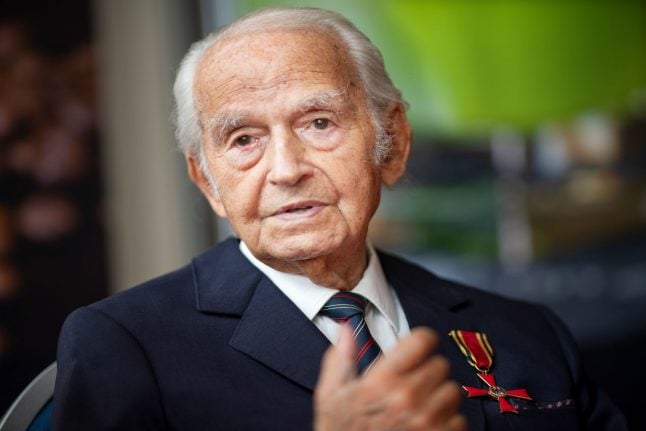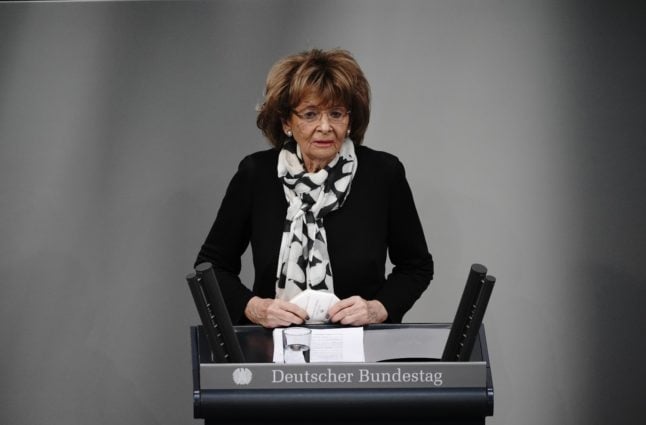At 98, he says his “duty to the dead” is to bear witness about what happened to him.
“I had the good fortune to survive. My family did not,” Schwarzbaum told AFP in an interview in his elegant apartment on the outskirts of Berlin.
Schwarzbaum was sent to Auschwitz in occupied Poland at the age of 22. His
parents were gassed to death on the day they arrived at the camp in July 1943.
In total, 35 members of his family were killed.
Schwarzbaum survived two years in Auschwitz, working as a forced labourer for Siemens, until he was taken away by fleeing Nazi troops as the Allies advanced.
READ ALSO: 'I weighed 32 kilos': Auschwitz survivors remember a living hell
Of the terrifying things he saw, one image of prisoners being driven to the gas chambers has haunted him his whole life.
“Naked people in a truck — their arms in the air praying to the heavens. They were crying,” he said.

Schwarzbaum in 2016 holds up a photo of his uncle and his parents, all three who lost their lives in Auschwitz. Photo: DPA
A cold sun shines through the windows of Schwarzbaum's apartment, filled with antique furniture, paintings and memories of a lifetime.
He shields his eyes from the sun with a wrinkled hand as he remembers the actions of the SS paramilitaries who ruled Auschwitz.
“The SS were there to take away people's names, to destroy their existence,” he said.
They tried to reduce Schwarzbaum to a prisoner number.
He lifts up the left sleeve of his woollen jumper to show the tattoo on his arm: “132 – 6 – 24”.
'I did not know whom I could tell'
Schwarzbaum, who is Jewish, grew up in Bedzin, a town some 60 kilometres
from Auschwitz.
He visited a few years ago and the poster of a documentary about his return
hangs above the mantlepiece.
But he has never wanted to move back.
Despite the painful memories, he moved to Berlin after the war because he had some friends there.
“They were now my family,” he said.
In divided Berlin, he fell in love with the woman who became his wife and they opened an antiques shop in front of the KaDeWe department store.
His wife, who died in 2012, still smiles at him from a framed picture in front of him.
For decades, Schwarzbaum kept his story to himself.
“I did not know whom I could tell about these monstrosities,” he said.
Nobody wanted to hear the survivors.
But in the 1970s, a wedding party on Wannsee lake outside Berlin brought back the horror.
Someone sitting next to him at the party asked: “Where were you during the war, my friend? I was in the SS.”
Schwarzbaum's wife answered for him: “My husband was at Auschwitz”.
'There is no forgiveness'
In his last years, Schwarzbaum has started to bear witness more frequently to younger generations and in front of the courts.
In February 2016, he told his story at the trial of former Auschwitz guard Reinhold Hanning, 93, one of the last on the Nazi era.
Schwarzbaum came out of it profoundly disappointed.

Schwarzbaum at a trial of former Auschwitz guard Reinhold Hanning in 2016. Photo: DPA
Hanning did not speak during the hearings, only providing a written confession.
A few minutes before the verdict which sentenced him to five years in prison, Schwarzbaum gave him a letter that he now reads, sitting on the edge of his sofa.
“There is no forgiveness. Only the people you killed as a member of the SS can forgive,” he wrote.
Hanning did not reply to the letter. He died in 2017.
On January 27th, the freezing weather means Schwarzbaum will not go to Auschwitz for ceremonies to mark the 75th anniversary of the camp's liberation.
A few days later, he will celebrate his 99th birthday.
READ ALSO: Merkel set to visit Auschwitz as Germany battles resurgence of anti-Semitism
By Yannick Pasquet




 Please whitelist us to continue reading.
Please whitelist us to continue reading.
Member comments